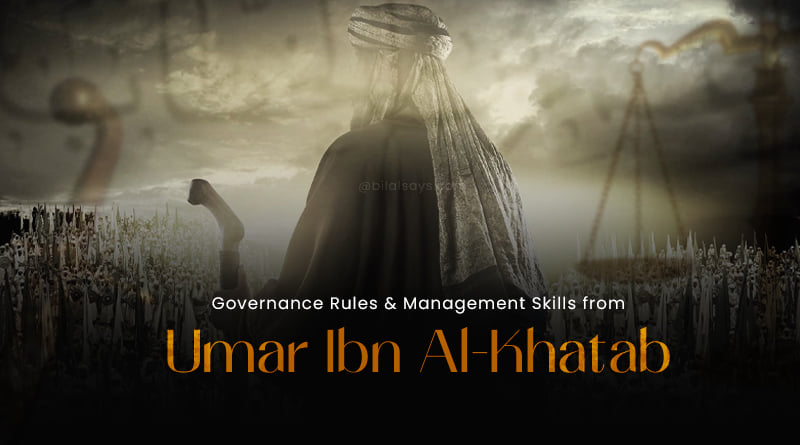Top 10 Governance Rules & Management Skills from Umar Ibn e Khattab
Umar ibn Al-Khattab, also known as Umar al-Makki, was a one of the closest companion of the Prophet Muhammad (صلى الله عليه وسلم) and the second Caliph of Islam. He is widely regarded as one of the most effective rulers in Islamic history & considered among the most influential people of the world; known for his fairness, wisdom, and justice.
In the annals of Islamic history, there is a towering figure whose legacy continues to inspire and guide millions of Muslims around the world. Umar Ibn e Khattab, famously known as Umar Farooq, was not only the second Caliph of Islam but also an embodiment of unwavering faith, wisdom, and justice. Through the acclaimed Umar series, we have the privilege to delve into the life of this remarkable leader and witness his remarkable journey of transformation.
From his early days as a staunch adversary of Islam to becoming one of its most devoted champions, Umar’s story is a testament to the transformative power of the message brought by the noble Prophet Muhammad (peace be upon him). As we explore the life of Umar and his profound impact on Islam, we are reminded of the eternal significance of the Quran, the Hadith, and the five pillars of Islam that he championed. Today, as we stand at the cusp of modernity, seeking spiritual guidance and understanding, the lessons from Umar Ibn e Khattab’s life hold more relevance than ever. Let us be inspired by his unwavering dedication, deep knowledge of the faith, and commitment to justice. For in the footsteps of Umar, we find a timeless source of strength to face the challenges of the modern world while remaining rooted in the essence of our faith.
As we strive to embody the principles he championed, let us remember the words of Louis Farrakhan, “The growth and development of people is the highest calling of leadership.” Indeed, Umar Ibn e Khattab’s leadership epitomizes the growth and development of a nation. Another third party valuation on epitome of Umar reign is of Michael Hart inclusion of him in his book of ‘The 100: A Ranking of the Most Influential Persons in History‘ in which He ranked him higher than many known famous men as Charlemagne and Julius Caesar. He believed that Umar’s brilliant leadership was responsible for the expansion of the Islamic territory and the enormous extent that it did occur under him. He further says that Umar Ibn Al-Khattab ordered the Muslim armies to leave the natives of the conquered land in peace and ordered the military personnel not to force the natives to convert to Islam.
Together, let us embark on this journey of discovery, and in the footsteps of Umar, let us find the guidance and motivation to shape our lives.
In this article, we will discuss Umar’s top ten governance rules and management skills that have made him a role model for leaders across the world.
- Fairness and Justice: Umar was renowned for his impartiality and fairness in administering justice. He was known to make decisions based on the Qur’an and the Sunnah of the Prophet, without any bias or discrimination. He is credited with introducing several reforms to the legal system, including the appointment of judges and the codification of Islamic law.
- Wise Decision-Making: Umar was known for his wisdom and ability to make wise decisions in difficult circumstances. He was known to seek the advice of others, including his advisors and the common people, before making important decisions. He was also known for his foresight and ability to anticipate problems, which helped him prevent potential issues from arising.
- Effective Leadership: Umar was an effective leader who was able to bring together diverse groups of people under a single banner. He was known to lead by example and was highly respected by the people, who followed his decisions without question. He was also known to be a good communicator, who was able to clearly articulate his vision and policies to his followers.
- Financial Management: Umar was known for his financial acumen and ability to manage the finances of the state effectively. He introduced several reforms in the financial sector, including the introduction of a standard currency and the establishment of a centralized treasury. He was also known to be frugal, and he set an example by living a simple life himself.
- Encouragement of Education: Umar was a strong believer in the importance of education and encouraged the spread of knowledge throughout the empire. He established schools and libraries, and encouraged people to seek knowledge, regardless of their social status. He was also known to have a deep understanding of the Qur’an and the Sunnah, and he encouraged others to study these sources of knowledge as well.
- Focus on Infrastructure: Umar was known for his focus on infrastructure and his efforts to improve the lives of the people. He was responsible for the construction of roads, bridges, and public buildings, which helped to increase commerce and improve the standard of living. He was also known to encourage agriculture, which helped to increase food production and improve the economic conditions of the people.
- Respect for the Law: Umar was known to be strict in enforcing the law, and he was always fair and just in his punishments. He was known to enforce the law equally, regardless of the social status of the offender. He also encouraged the establishment of a strong judicial system, which helped to ensure that the laws were fairly and consistently enforced.
- Encouragement of Trade and Commerce: Umar was known to encourage trade and commerce, and he was instrumental in the expansion of the empire’s economy. He was known to support merchants and traders, and he encouraged the development of trade routes and markets. He also established a system of tariffs and taxes, which helped to support the state’s finances.
- Be Accessible, Humble & Responsive to Needs of Your Sub-Ordinates: Umar (R.A) was accessible to the public and encouraged open communication with his subjects. He held regular public gatherings (Majlis) where people could approach him freely to express their grievances, seek guidance, and present their ideas. This accessibility demonstrated his commitment to inclusivity and allowed him to stay connected with the needs and aspirations of the people he served.
- Democracy & Accountability Essence of Any Establishment: Umar was committed to consultation (Shura) as a core principle in governance, seeking the opinions of his advisors and the people before making important decisions. He often emphasized the importance of seeking counsel from various segments of society, regardless of their background or social status. Furthermore, Umar was keen on establishing a system of accountability for those in positions of authority. He implemented strict measures to prevent abuse of power and corruption. He regularly conducted audits and investigations to ensure that public funds were being used appropriately and that the welfare of the citizens was prioritized. This approach helped to instill a sense of trust and transparency in his administration, fostering a democratic atmosphere where the voice of the people mattered.
A nation that attaches it’s affairs to one man, is bound to fail.
Umar Ibn e Al-Khattab Quotes
In conclusion, Umar ibn Al-Khattab’s governance rules and management skills have made him a role model for leaders across the world. His fairness, wisdom, effective leadership, financial management, encouragement of education, focus on infrastructure, respect for the law, and encouragement of trade and commerce are a testament to his success and an inspiration to those who seek to lead.




